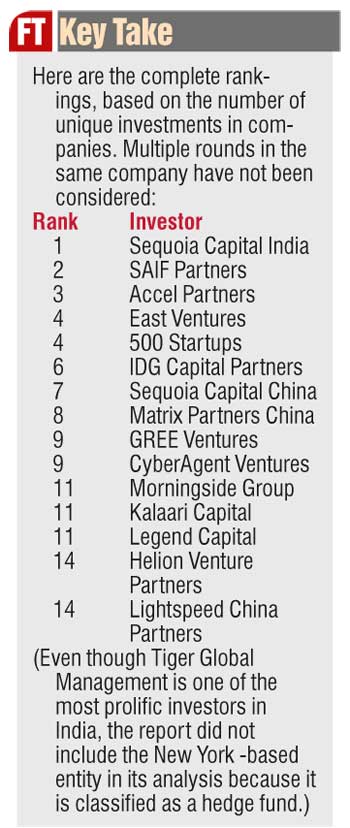Thursday Feb 26, 2026
Thursday Feb 26, 2026
Tuesday, 1 September 2015 00:36 - - {{hitsCtrl.values.hits}}
A decade ago, much before the likes of Flipkart and Snapdeal grew into behemoths, Sequoia Capital had already made its first bet on the Indian startup ecosystem.
In 2006, the storied Silicon Valley enterprise—with a history of backing technology giants such as Apple, Google, LinkedIn and WhatsApp—acquired Westbridge Capital Partners, an Indian venture capital firm. Westbridge had already established two funds, raising a total of $340 million (Rs2,168 crore). It was later renamed Sequoia Capital India.
Since that early wager on the subcontinent, Sequoia Capital India has invested in some 100 companies in the country, according to data compiled by analytics firm Tracxn, including high-profile startups like Ola, Zomato and Micromax.
And its appetite |
isn’t waning.
Between April and June 2015, Sequoia Capital India was the most active venture capital investor in all of Asia, according to a ranking by CB Insights and KPMG. The investments by Sequoia in these three months include the hyper-local grocery delivery platform Grofers, the on-demand grocery app Peppertap, and Urban Ladder, an online furniture retailer.
Early starter
In 2006, Sequoia Capital India raised $400 million (Rs2,550 crore), followed by another $300 million (Rs1,913 crore) in 2007—becoming the first Silicon Valley venture capital firm to have an exposure of more than $1 billion in India. In the same year, it invested $11.5 million in SKS Microfinance, then India’s largest micro-finance company.
It didn’t take long for the venture capital firm to establish its dominance. Since 2010, according to research firm Pitchbook, Sequoia India, and Accel Partners together formed around a quarter of all venture capital investments from the US to India.
Over the years, Sequoia’s India investments have ranged from healthcare to financial services, and beauty and  personal care to kitchen appliances. But it is technology that’s often seen as Sequoia Capital India’s sweet spot, with investments in startups including digital wallet MobiKwik, fashion app Voonik, and self-driven car rental firm ZoomCar.
personal care to kitchen appliances. But it is technology that’s often seen as Sequoia Capital India’s sweet spot, with investments in startups including digital wallet MobiKwik, fashion app Voonik, and self-driven car rental firm ZoomCar.
Meanwhile, Sequoia has exited a total of 12 companies in India—of which seven got acquired, three went for an initial public offering (IPO) and two were shut, according to Tracxn. It exited SKS Microfinance, Just Dial and Mannapuram Finance when these companies went for IPOs.
Some other investee firms, like Freecharge, TutorVista, Dexetra and ApnaPaisa, among others, were acquired.
Now, Sequoia India—which raised another $210 million (Rs1,347 crore) this April—is betting on businesses looking to tap into the massive number of Indians who are moving online, often through their mobile phones. Last year, Shailendra Singh, a managing director with Sequoia India, argued that investors need to prepare for an environment “where the world’s largest mobile/internet user base will be in India.”
“Possibly, many Silicon Valley companies could have their largest user base in India in the time to come. That will change everything in our view,” he said.
Sequoia Capital India declined to comment for this story.
Hits and misses
In India, bankers and entrepreneurs who have engaged with Sequoia Capital India say the firm has a strong research framework with a habit of catching startups early.
“They are a very strong, research-driven organisation and their conviction about industries is very strong as a result of this,” said Vineet Toshniwal, managing director of Equirus Capital, a Mumbai-based boutique investment bank.
“Also, because of a global presence, they have a strong connect with the emerging industries globally, especially in the US.”
When the venture capital firm first invested in Practo in 2012, the online healthcare platform had just 12 employees. That team has now expanded to some 2,000—and co-founder and CEO Shashank N.D. partly attributes this growth to Sequoia’s support.
“It is not just about the money,” the National Institute of Technology graduate explained. “They have a very strong team that has helped us in areas like finance, marketing, legal and hiring. We can leverage from their knowledge.”
That ability to back fast-growing startups is a quality that some entrepreneurs, often themselves leading rapidly-expanding firms, find especially useful.
“Most of Sequoia’s portfolio companies have scaled up fast and that experience is very relevant for us at this point of time as we scale up,” Urban Ladder’s CEO and co-founder Ashish Goel explained.
Nonetheless, Sequoia also has its critics—and some are especially vocal.
In March, Rahul Yadav, co-founder and then-CEO of real-estate portal Housing.com, had accused Sequoia Capital India’s Shailendra Singh of poaching employees in an angry email.
“You did the same inhuman and unethical things with (a) large number of entrepreneurs including Ola, TFS (TaxiForSure), Flipkart, Dexetra, and many more…,” Yadav wrote in the email, which was leaked on Quora.
“Now I just came to know you are personally and completely after Housing’s employees and are brainwashing them to open some stupid incubation.”
The incident triggered an unprecedented spectacle in the Indian startup ecosystem, with several entrepreneurs, investors and industry veterans either publicly siding with the young entrepreneur or the venture capital firm.
Among others, Sachin Bansal, the co-founder and chief executive of Flipkart, took on Sequoia.
He wrote on Twitter, “Sequoia isn’t an investor with us. I would just say I’m glad to have it that way.” (Source: Quartz India)